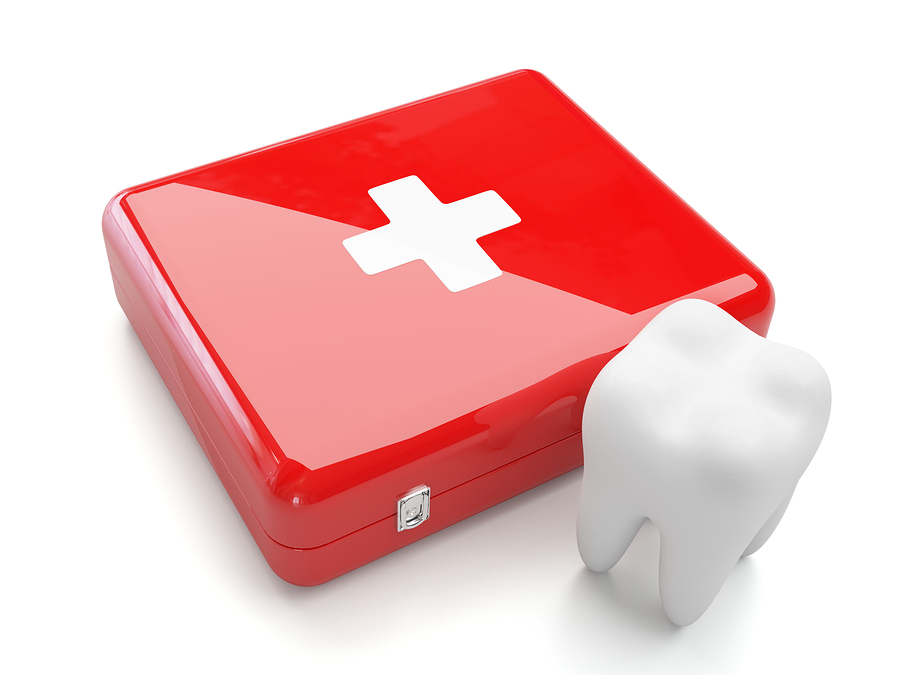Knocking out a tooth in an accident, cracking a molar on some hard food, or experiencing a sudden, unexplained toothache: All of these can be considered a dental emergency, requiring quick, professional diagnosis and treatment. Sometimes, however, it’s difficult to know whether you, or someone else, is experiencing a real emergency. This resource guide can help you understand whether you have a need for emergency dentistry, and what you need to do if you experience dental trauma.
What is a Dental Emergency?
A dental emergency is an oral health condition that requires timely attention from your dentist. In some cases, the nature of the emergency is obvious, such as a tooth that has been knocked out or severely cracked. In other situations, you may have pain or bleeding but may be unsure of Its primary cause.
As with any medical emergency, it is important to get professional advice and treatment right away. Ignoring bleeding, severe pain, or a loosened or broken tooth can create complications that will require more extensive and expensive treatment later on.
How do I Know if a Situation Meets the Dental Emergency Definition?
Not all dental conditions qualify as emergencies, as they do not require immediate care. Broken crowns, lost fillings, a mild toothache, or a lost or broken dental appliance (such as a mouthguard or retainer) can be aggravating, but are not real emergencies. They will eventually require care, so you should still call your dentist, but you will likely not need an emergency appointment.
Emergencies typically involve severe pain, uncontrolled bleeding, or a tooth that is at risk. A tooth that is at risk has been knocked out, severely loosened, broken, or cracked. It is important to seek professional care without delay to improve your chances of saving your tooth.
What Do I Do if I Believe I Need Emergency Dental Care?
It can sometimes be confusing when you need to decide where to go for a dental emergency. In general, calling your own dentist is your best option, but that is not always possible. In such cases, you may need to seek care from your local emergency room.
When possible, call your dentist first. If your emergency happens outside of regular business hours, check the office’s website or any paperwork from a previous visit to see if an emergency number is listed. If you can’t find one, call the office anyway. You may be able to speak to an answering service can have your dentist call you back. Otherwise, the office voicemail may give you instructions for seeking emergency care.
If you are out of town, you may need to get a referral to a local dentist. Your dentist may be able to provide you with a referral. If you have a dental plan or participate in a dental discount program, call it customer service number to see if they can recommend in-network dentist where you are.
Go to the emergency room if you can’t reach your dentist and have lost a tooth, are in danger of losing a tooth, have uncontrolled bleeding, or are in serious, unbearable pain. If you do go to the emergency room, be sure to notify your dentist about what happened as soon as possible. Your dentist will be able to provide follow-up care.
What Should I Do While Waiting for a Callback or Care?
Waiting for a call from a doctor or dentist can be frustrating and nerve wracking. While you wait for emergency care or word back from your dentist, it is important to stay calm. There are a few things you can do to help keep calm, protect your tooth, and to stay comfortable:
If your tooth has been severely loosened or knocked out, do what you can to keep it in its socket. Try putting some moistened gauze over it to help hold it in place, but be sure to take care that you don’t swallow it. Remember to avoid touching the root of the tooth as to not introduce any new bacteria.
Rinsing your mouth with warm salt water can alleviate pain and help keep you comfortable while you wait. You can also use a cold compress on your cheek near the tooth to help reduce pain and swelling.
If you do get in touch with your dentist and have to wait for your emergency appointment, ask him or her what you can do to take care of yourself. In some cases, your dentist may instruct you to take an over-the-counter pain reliever or even prescribe a painkiller that can help you manage your discomfort until you can receive treatment.
The Gentle Dental Approach to Emergency Dentistry
At Gentle Dental, we understand that dental emergencies can be uncomfortable and upsetting. If you are a patient of record, you can call our office at any time, and we will endeavor to get you in for an appointment within 24 hours. You may also be able to speak with one of our dentists over the phone so that you can explain your symptoms, get your questions answered, and learn what next steps you need to take.
Final Word
Having a relationship with a dentist can simplify things if you need emergency care. If you don’t have a dentist, make an appointment for a cleaning and checkup at one of our neighborhood dental offices. This gives you a chance to get to know our dental professionals and become a patient of record so that we can better assist you if you have an urgent need for care. We offer weekend and evening appointments for your convenience, and accept most insurance plans, major credit cards, and also provide financing options.



 Previous Article
Previous Article